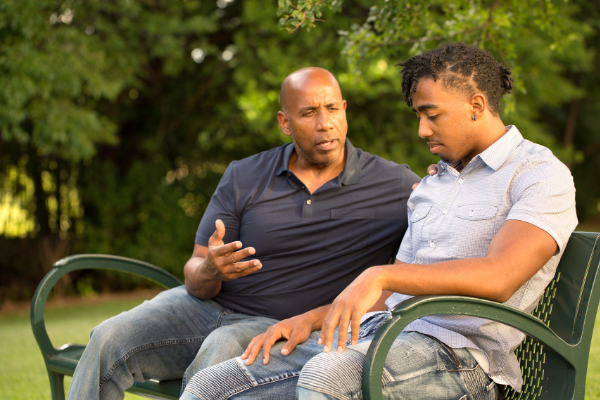By Trina Bass, Family First Therapist
There’s immense stigma around mental health in the world. Today, I’m going to be addressing the stigma that lives within the black community. I am a black therapist. I care deeply for the mental health of all people, but especially those in our community. People of color face unique challenges throughout their lives that impact their mental health. The trauma, poverty, stress, and prejudice that many black communities experience can lead to genuine struggles with anxiety, depression, ADHD, and more. However, we are less likely to report and seek help for fear of judgment or, in some cases, the denial that mental health even is a “thing.”
Let’s look at the numbers. As the National Alliance of Mental Health shares, only 1 out of 3 black adult Americans will seek out care for their mental health. According to the American Psychological Association, between 1921 and 2017, the suicide rate has increased 73% for black adolescents compared to white adolescents. In high school, 198,000 adolescents of color are involved in some type of suicide attempt or success. The suicide risk for black boys ages 5-11 has elevated since 2018. For adolescent black girls, the suicide rate has increased 59%. These numbers don’t lie. In the black community and culture, mental health has a major effect on us and action, and support, is critical.
What people experience on a day-to-day basis directly impacts our mental health. There are a lot of things people come across that can build up and cause mental illness and stress. Some of those things are the discrimination, taunting, abuse (whether it’s physical or emotional), which impact different parts of our mental health. One of the major things people of color in particular encounter is trauma. You can experience trauma in your personal life or even through the internet and social media. Seeing videos of people like us being stopped in their cars, harassed, or killed is traumatic. I watched a video of a child, no more than 5 years old, being held on the ground in handcuffs and, turns out, it was a case of mistaken identity. I couldn’t help thinking that this mistake caused a young 5 year old little girl to experience trauma and hope that she will get the therapy she needs to heal. When spaces that should be safe are not always so, it can cause trauma. Research has shown that students who are black face are of a higher rate of trauma and school discipline. In schools, as in the world, there is a view of black people that is totally different from white students or other ethnic backgrounds. Our subconscious bias can lead to viewing them as being more difficult, to be disciplined differently, and the more prone to be caught up in the judicial system. The systemic racism and cycle of hurt has a direct impact on our communities and mental health. It’s not a sign of weakness. It’s just fact. The things that happen in our lives have impact on our minds and brains.
Discussing mental health can be extremely difficult for black Americans. In many communities, there is a belief that admitting to any type of mental health struggle is a sign of weakness or is a sign of lack of strength or of not being able to uphold standards as a family member or take care of the things. This is not true! If we don’t take care of ourselves as individuals, it only grows. When we are struggling, we cannot help others. Our bodies and minds are interconnected. Mental pain impacted physical pain and vice versa. Mental health must be addressed.
I know that it can be scary to go to health providers, especially mental health providers. Will the provider view my child equally? Will they misdiagnose them? Will they project prejudice onto my child? If you have these worries, you’re not alone. But, as a black therapist myself, I want to assure you that compassionate, comprehensive, and life-changing therapy exists for you and your child. You deserve a clinician and treatment team who works to understand your culture, beliefs, background, and to assess and diagnose with that in mind. If you don’t feel like that is happening, stick it through and find another therapist. Don’t give up! Good care exists and you deserve it.
We need to recognize and accept that mental health matters and deserves our care and prioritization. We cannot think that psychology or mental health is a “crazy” thing. Our brain is complex. Mental illness is a body functioning deficit that we all will come across and may experience. Whether you are black, white, whatever the color of your skin, mental health doesn’t discriminate. Mental health struggles can take hold of everyone. Seeking out help when this happens is always the answer. There is nothing wrong with you. Taking care of you, it is important. Being able to ask for help, releasing stressors, releasing the pressure, and processing your trauma by seeking therapy is okay – in fact, it’s admirable. The stigma that is out there is not true. Mental health for black people does exist. It impacts all of us. As we look at our young people, we see increasingly that suicide and mental health issues are high. How can we address it? What can we do right now to change it? Step one is to acknowledge it. Step two is to seek help. Then, we can change it – not just for us, but for generations to come.

